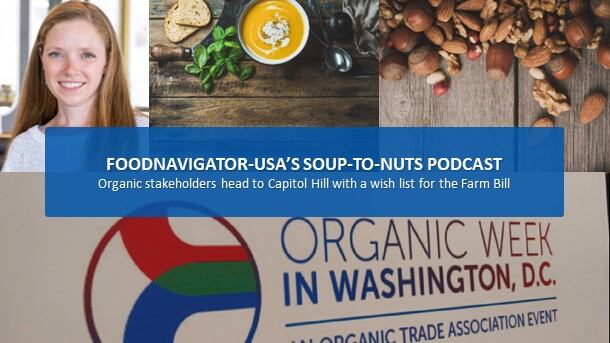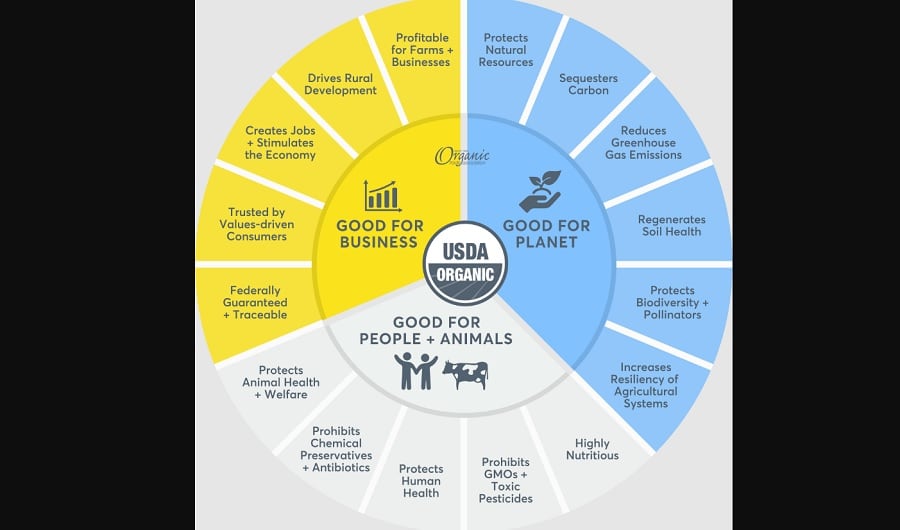The annual fly-in event was the capstone for the Organic Trade Association’s Organic (OTA) Week, during which industry and government leaders came together to analyze market trends and consumer insights, celebrate a 3.4% increase in organic sales in 2023 and expanded public-private partnerships, address challenges, such as a proliferation of eco-claims that are not held to the same rigorous standards as USDA Certified Organic, and explore opportunities for growth, including how to best reach the next generation of consumers.
In this episode of FoodNavigator-USA’s Soup-To-Nuts Podcast, OTA Co-CEO Matthew Dillion discussed the industry’s top four priorities for the upcoming farm bill, and OTA Co-CEO Tom Chapman shared highlights from the trade association’s 2024 Organic Industry Survey, which includes hot spots for organic and areas primed for growth or ready for innovation.
[Editor’s Note: Never miss an episode of FoodNavigator-USA’s Soup-To-Nuts podcast – subscribe today.]
OTA zeros in on legislation that will 'empower the US organic industry to meet future challenges and consumer demands'
OTA’s long-planned lobbying day serendipitously fell a week after the House and Senate released its frameworks for the upcoming Farm Bill and days before the House Agriculture Committee’s May 23 meeting to mark up the new farm bill.
“It is a very important time for us to weigh in as farmers, as businesses, as aggregators and advocates for organic to explain why organic is good for the rural economy, good for our planet and good for the American farmer,” Dillon said.
He noted that while OTA’s wish list for the Farm Bill and support from the government and legislators is “much longer than four points,” the trade group is focused on generating support for the Organic Market Development Act, the Continuous Improvement and Accountability in Organic Standards Act, the Organic Dairy Data Collection Act, and several bills focused on organic research.
OTA members’ first ask – for continued federal investment in organic infrastructure through the Organic Market Development Act – which would build upon a $300m commitment made by USDA in 2021 to support the transition of farmland to organic, including a one-time commitment of $75m for Organic Market Development grants, applications for which exceeded $200m – underscoring the need for more funding.
“It was wonderful to have that one time $75 million funding for those grants. The USDA received $218 million in requests. And we think there is even more need and demand from our farms and businesses for those resources to keep growing organic and get over the bottlenecks,” Dillon said.
He explained that the Organic Market Development Act seeks $75 million on an ongoing basis and annual funding to continue these programs. In the Senate Farm Bill framework, there is $50m to support these programs, which OTA is “happy to see,” but which Dillon says needs to be higher.
According to OTA, grants under OMD would focus on three project types – 24-month simplified equipment-only funding between $10,000 and $100,000 to help farmers buy and install new processing equipment; process, package and store product on farm; and access to markets and crop protection from weather and pests while waiting to go to market. The second tier would include 3-year market development grants between $100,000 and $3m with 50% cost share to develop new products, marketing avenues and consumer education. The last would be for grants of $100,000 to $3m with 50% cost share focused on processing capacity expansion.
Developing the organic is market is more than building supply – it is also developing demand, which requires increased consumer education. To help shoppers understand the benefits of organic and why they should buy it, OTA received a $2.2m Organic Market Development grant, which the trade group and its sister organization The Organic Center will match for a total of $4.4m. The grant will fund a three-year consumer education campaign.
OTA advocates for continuous improvement
OTA’s second ask is for support for the Continuous Improvement and Accountability in Organic Standards Act – or CIAO (HR 5973), which Dillon explained speaks to both a core tenet of the USDA organic label, and a shortcoming that has frustrated and confused consumers and left the industry vulnerable to competing eco-labels.
“The Organic Trade Association has been advocating for the continuous improvement and accountability and Organic Act for a number of years. And the reason we have is that organic is a public-private partnership between private sector and USDA National Organic Program. And they have been great partners in many, many ways. However, there have been places where the business community and the consumers [they] are trying to serve have evolving needs that the USDA has been slow to respond to,” said Dillon.
He explained the CIAO Act would require USDA to work with stakeholders in a five-year cycle that would require policymaking movement.
Dillon explained that the process outlined in CIAO would fit within and complement the existing National Organic Standards Board review process, which currently includes two meetings annually. Under the new process, the National Organic Program with input from NOSB and the public, would identify a list of regulatory priorities on which to begin rulemaking before the 5-year cycle ended.
Demand for dairy data to level the playing field
Like the CIAO Act, the third item on OTA’s wish list is for support for another no-cost, bipartisan bill – HR 6937, or the Organic Dairy Data Collection Act, which Dillon explained would help USDA design better organic programs, promote farm resilience and mirror conventional data collection.
“All agricultural producers of all crops or animal agriculture need good information to make business decisions, to know if they should be expanding production, contracting production, what is going on in the marketplace,” said Dillon.
“Conventional dairy producers have great data on the cost of feedstuffs, for example, so they understand that they might need to shrink or herd because the cost of corn or soy or hay is exceedingly high right now. And it is continuing to trend that way. In organic, we do not have access to the same data. And so our producers are not on a level playing field when it comes to making decisions about their business operations,” he added.
The Organic Dairy Data Collection Act would require USDA to collect the same data for organic dairy producers as for their conventional counterparts.
Additional research key to growth
The last item on OTA’s shortlist for members’ Hill visits was for improved stakeholder coordination and additional funding for organic research. Dillon explained this would include support for three bills – The Organic Science Research Investment Act (S. 2317) and The Rural Prosperity and Food Security Act of 2024, which would enhance organic research, and the bipartisan Strengthening Organic Agriculture Research (SOAR) Act (HR 2750), which would reauthorize and increase funding for the Organic Research and Extension Initiative from $60m to $100m.
“All farmers need good research that has applications in the field to improve their effectiveness and their efficiency and profitability,” said Dillon.
Organic is growing
Each of these requests would help drive growth across the US organic industry, which OTA research released at the conference pegged at $69.7bn in 2023. As OTA Co-CEO Tom Chapman explained, this “new high” is “generally positive” and “better than previous years when organic has faced both confounding problems of inflation and supply chain.”
But, he added, the growth was uneven across categories – revealing opportunities for innovation and development to help the industry return to the double-digit gains it saw pre-pandemic.
OTA is optimistic about the future because additional research found organic manufacturers had higher confidence in its supply chains in 2023 and inflation is slowing – setting 2024 up to be a year of recovery for organic.




